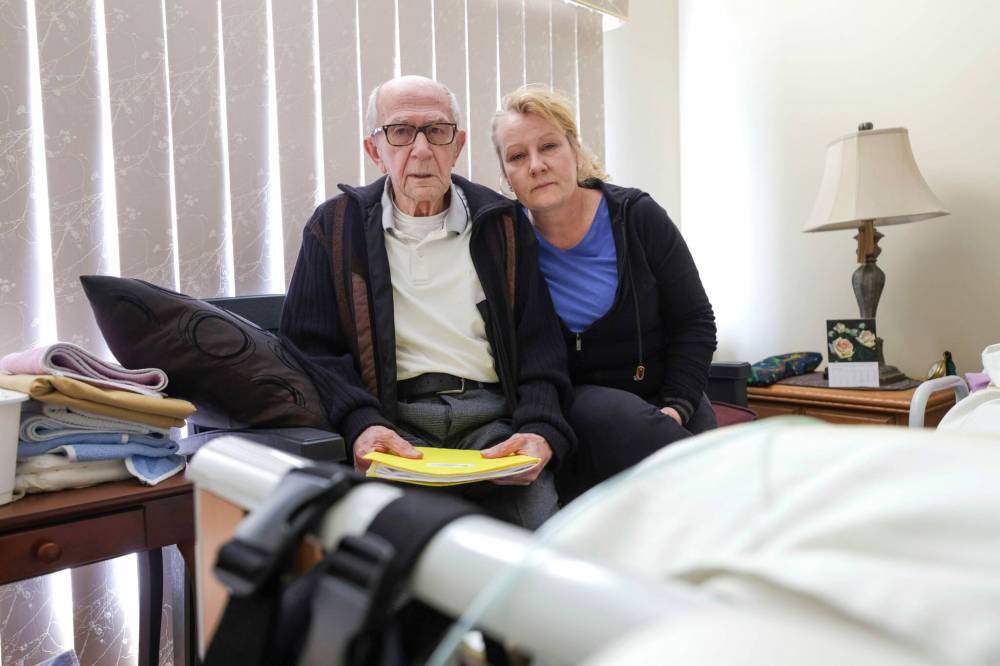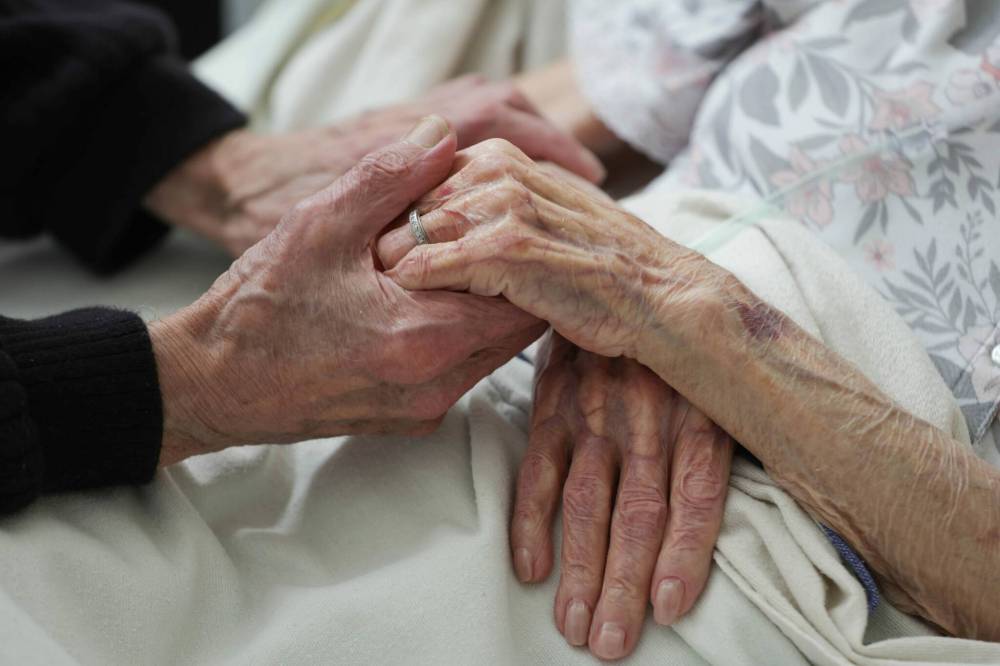‘My condo is my prison’ Physically, emotionally drained 87-year-old husband pays thousands of dollars for private home care as public system collapses
Read this article for free:
or
Already have an account? Log in here »
To continue reading, please subscribe:
Monthly Digital Subscription
$0 for the first 4 weeks*
- Enjoy unlimited reading on winnipegfreepress.com
- Read the E-Edition, our digital replica newspaper
- Access News Break, our award-winning app
- Play interactive puzzles
*No charge for 4 weeks then price increases to the regular rate of $19.00 plus GST every four weeks. Offer available to new and qualified returning subscribers only. Cancel any time.
Monthly Digital Subscription
$4.75/week*
- Enjoy unlimited reading on winnipegfreepress.com
- Read the E-Edition, our digital replica newspaper
- Access News Break, our award-winning app
- Play interactive puzzles
*Billed as $19 plus GST every four weeks. Cancel any time.
To continue reading, please subscribe:
Add Free Press access to your Brandon Sun subscription for only an additional
$1 for the first 4 weeks*
*Your next subscription payment will increase by $1.00 and you will be charged $16.99 plus GST for four weeks. After four weeks, your payment will increase to $23.99 plus GST every four weeks.
Read unlimited articles for free today:
or
Already have an account? Log in here »
Hey there, time traveller!
This article was published 24/02/2023 (1022 days ago), so information in it may no longer be current.
When his wife of 62 years was given a prognosis of two months to live, Raymond Duerinckx decided it would be best for her to spend her final days at home.
Nine-and-a-half months later, the family has had to turn to private home-care services and is feeling unrelenting emotional and financial strain as live-in caregivers.
Eighty-nine-year-old Tannis Duerinckx suffered a heart attack and was diagnosed with congestive heart failure last spring. Her family felt pressured after Grace Hospital management told them she was palliative and there was nothing more the facility could do for her.
The only other option was a nursing home. Taking her home rather than waiting for a personal-care home bed made the most sense, especially since the Winnipeg couple’s daughter Michelle Duerinckx is an experienced health-care aide. They thought home-care visits could fill in the gaps in Tannis’s care and give father and daughter some respite from their around-the-clock caregiving.
The reality, however, was much more difficult.
RUTH BONNEVILLE / WINNIPEG FREE PRESS Raymond Duerinckx, 87, and his daughter Michelle Duerinckx, look after wife and mother Tannis who is in palliative care at home after heart failure.
Raymond, 87, has lost 35 pounds over the last nine months. His legs are giving out, and he said he’s reaching the end of his capacity to look after his wife.
“My condo is my prison here. I don’t go out. I live day to day with my wife, knowing that there is no help outside of there to give me.”
After she was released from hospital, Tannis never got the level of home care she needed through the Winnipeg Regional Health Authority’s program, her husband and daughter say.
“They are people that are going home to die. They need proper support,” said Michelle, who took a leave from work and moved out of the home she shares with her husband to be with her mother overnight.
Many families don’t have that option, she emphasizes.
“I don’t want to see one more family ever going through this,” she said.
“My condo is my prison here. I don’t go out. I live day to day with my wife, knowing that there is no help outside of there to give me.”–Raymond Duerinckx
Instead of 12 hours of respite care a week, they got only four, with frequent last-minute cancellations as home-care workers were pulled away to look after other clients, Michelle said.
After two months, they switched to self-managed care, which required them to hire a private home-care agency and pay out of pocket for costs not covered by the WRHA’s Self and Family Managed Care program, which covers 55 hours a week at $21.40 per hour for Tannis, but the private workers the family hired cost $30 per hour. Raymond pays the difference, spending more than $1,000 every two weeks.
Tannis, who will be 90 March 6, is doing well at home under the care she’s receiving, though she’s still bedridden and on oxygen. Speaking through her daughter, she said she’s grateful.
Her husband has been seeking out online support groups dedicated to senior caregivers, and says the province’s recent promises to support seniors ring hollow. His family, he knows, is more fortunate than many.
RUTH BONNEVILLE / WINNIPEG FREE PRESS Raymond Duerinckx, 87, has lost 35 pounds over the last nine months and he said he’s reaching the end of his capacity to look after his wife.
“Lucky she’s got my daughter and myself, and lucky I can afford to pay for the people to come here,” he said.
The WRHA has promoted self-managed home care as an option for families, acknowledging long waits and staff shortages in the public home-care program. As part of the health authority’s response to the case of Katherine Ellis, who was granted her first home-care visit three days after her death last week, a WRHA spokesperson said palliative patients are prioritized for home care, yet encouraged caregivers to turn to the self-managed program.
“This provides clients and/or their families or caregivers more autonomy and decision-making power when it comes to their personal-care needs,” the spokesperson wrote in a statement earlier this week.
The experience endured by Ellis and her family is another example of why patients shouldn’t be discharged from hospital until reliable home-care services are set up for them, Michelle said. But as a health-care aide, she’s well aware of staff being stretched too thin.
“I don’t want to see one more family ever going through this.”–Michelle Duerinckx
“If they’re so concerned about bringing people home to die, set up a proper unit for them,” she said. “But you know what? There isn’t enough workers. There isn’t enough workers because so many of us have quit because of the working conditions.”
Multiple home-care workers interviewed on condition of anonymity said they are being pushed to their limits, with only 15 to 25 minutes to complete most scheduled visits, including travel time, and a workload of roughly 20 to 25 calls each day.
One Winnipeg-based home-care worker said she is taking a pay cut to work at a private agency, where she hopes the environment will be less stressful and won’t leave clients hanging.
“I would rather work for a place that cares about their clients,” she said.
No one in the offices of Minister for Seniors and Long-term Care Scott Johnston or Health Minister Audrey Gordon responded to a Free Press request for comment.
“It’s demolition by neglect of our health-care system.”–Liberal Leader Dougald Lamont
Opposition NDP Leader Wab Kinew said the problem has a political cause, saying home-care workers’ concerns about getting proper compensation and mileage reimbursements need to be quickly addressed.
He said he continues to hear from people across the province about home care, and commends families for speaking out.
“It really is a situation that is impacting a lot of families in a lot of regions, and this is a program in which Manitoba was a leader across the country when it was established. And to see it fall into such a state of chaos caused by poor political management by the PCs is disappointing.”
Liberal Leader Dougald Lamont said the problems are the result of starving the public home-care program, squeezing workers and treating in-home care as a “production line.”
“It’s demolition by neglect of our health-care system,” he said.
On Thursday, union leaders and the Manitoba Health Coalition decried the current state of Manitoba’s home-care programs. Provincial coalition director Thomas Linner said families shouldn’t have to bear the burden of going public with their concerns.
“Families, and workers here, are suffering in silence from the situation that’s been created,” he said, calling on the government to begin licensing all private health services in order to protect the increasing number of Manitobans who aren’t being served adequately by provincial home care.
And the advocacy group wants detailed home-care information posted online.
“All we know is that the system is falling apart, but we don’t have the data to fix it,” Linner said.
katie.may@freepress.mb.ca

Katie May is a multimedia producer for the Free Press.
Our newsroom depends on a growing audience of readers to power our journalism. If you are not a paid reader, please consider becoming a subscriber.
Our newsroom depends on its audience of readers to power our journalism. Thank you for your support.










